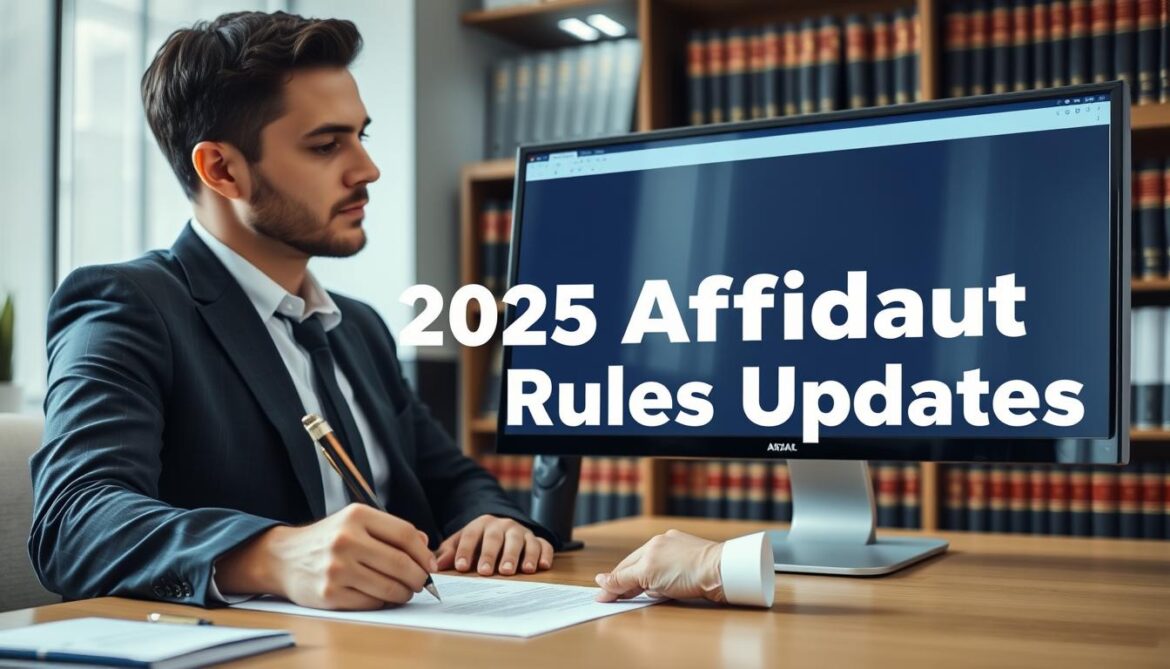Resources & Insights
शपथपत्रांचे कायदेशीर महत्त्व
शपथपत्रे (Affidavits) ही शपथपूर्वक दिलेली लिखित विधाने आहेत, ज्यांना न्यायालयीन कार्यवाही आणि प्रशासकीय बाबींमध्ये मोठे कायदेशीर महत्त्व असते. २०२५ मध्ये, शपथपत्रांच्या नियमांमध्ये अनेक महत्त्वाचे बदल लागू करण्यात आले आहेत, ज्यामुळे ही महत्त्वाची कागदपत्रे कशी तयार केली जातात, त्यांची पडताळणी कशी होते आणि ती कशी सादर केली जातात, यावर परिणाम होईल. हे बदल शपथपत्र प्रक्रिया अधिक आधुनिक, सुलभ आणि आपल्या वाढत्या डिजिटल जगात त्यांची सत्यता टिकवून ठेवण्यासाठी करण्यात आले आहेत.
शपथपत्र म्हणजे काय?
शपथपत्र हे तथ्यांचे एक लिखित विधान असते, जे ते तयार करणारी व्यक्ती (deponent) एका अधिकृत साक्षीदारासमोर (witness) सत्य असल्याचे शपथपूर्वक सांगते. ही कागदपत्रे आपल्या कायदेशीर प्रणालीमध्ये महत्त्वाची भूमिका बजावतात, कारण ती शपथपूर्वक दिलेली साक्ष म्हणून न्यायालयात पुरावा म्हणून सादर केली जाऊ शकतात. त्यामुळे साक्षीदाराला स्वतः प्रत्यक्ष हजर राहण्याची गरज नसते.
कौटुंबिक कायद्याचे खटले, मालमत्तेचे वाद, दिवाणी दावे आणि प्रशासकीय कार्यवाही अशा विविध कायदेशीर संदर्भांमध्ये शपथपत्रांचा वापर केला जातो. याद्वारे, व्यक्ती आपल्या बाजूने घडलेल्या घटना किंवा तथ्यांचे वर्णन शपथ घेऊन सादर करू शकतात. यामुळे, ती माहिती कायदेशीररित्या बंधनकारक ठरते आणि जर ती खोटी आढळली, तर खोट्या साक्षीच्या (perjury) कायद्यांनुसार शिक्षा होऊ शकते.
शपथपत्राला कायदेशीर वजन तेव्हा मिळते, जेव्हा ते नोटरी पब्लिक, शपथ घेण्यासाठी नियुक्त अधिकारी (commissioner for oaths), किंवा सॉलिसिटर (solicitor) अशा अधिकृत व्यक्तीसमोर शपथपूर्वक दिले जाते. ही पडताळणी प्रक्रिया विधानांची सत्यता सुनिश्चित करण्यासाठी आणि कोणतीही खोटी माहिती दिल्यास शपथ देणाऱ्या व्यक्तीला जबाबदार धरण्यासाठी तयार करण्यात आली आहे.
२०२५ च्या शपथपत्र नियमांमधील महत्त्वाचे बदल
२०२५ मधील शपथपत्र नियमांमधील अद्यतने ही ही कागदपत्रे कशी तयार केली जातात, त्यांची पडताळणी कशी होते आणि ती कशी सादर केली जातात, यात मोठे बदल घडवून आणणार आहेत. हे बदल तंत्रज्ञानातील प्रगती आणि कायदेशीर प्रक्रिया अधिक कार्यक्षम बनवण्याची गरज दर्शवतात.
१. डिजिटल नोटरायझेशन मानके
२०२५ च्या नियमातील सर्वात महत्त्वाचा बदल म्हणजे डिजिटल नोटरायझेशन प्रक्रियेचे प्रमाणीकरण (standardization). यापूर्वी, डिजिटल नोटरायझेशन प्रत्येक अधिकारक्षेत्रात भिन्न होते, ज्यामुळे गोंधळ निर्माण होत होता. नवीन नियमांनुसार, शपथपत्रांच्या रिमोट ऑनलाइन नोटरायझेशनसाठी (RON) एकसमान नियम लागू करण्यात आले आहेत. त्यात हे समाविष्ट आहे:
- शपथ देणारी व्यक्ती आणि नोटरी या दोघांसाठी अनिवार्य द्वि-घटक प्रमाणीकरण (two-factor authentication).
- संपूर्ण नोटरायझेशन सत्राचे रेकॉर्डिंग आणि सुरक्षित साठवणूक किमान सात वर्षांसाठी करणे बंधनकारक.
- ब्लॉकचेन पडताळणीसह प्रमाणित डिजिटल मुद्रा (seals) आणि प्रमाणपत्रे.
- रिमोट सत्रादरम्यान व्हिडिओ गुणवत्ता आणि कनेक्टिव्हिटीसाठी विशिष्ट तांत्रिक आवश्यकता.
२. आंतर-अधिकारक्षेत्रीय वैधतेमध्ये सुधारणा
२०२५ च्या नियमांनुसार, शपथपत्रांच्या आंतर-अधिकारक्षेत्रीय मान्यतेसाठी एक प्रमाणित आराखडा तयार करण्यात आला आहे. यामुळे, एका अधिकारक्षेत्रात शपथ घेतलेल्या शपथपत्रांना दुसऱ्या अधिकारक्षेत्रात अतिरिक्त पडताळणीशिवाय मान्यता न मिळण्याचे आव्हान दूर होईल. महत्त्वाचे बदल:
- सर्व न्यायालयांना सुलभ राष्ट्रीय शपथपत्र नोंदणी डेटाबेसची निर्मिती.
- अधिकारक्षेत्रांमध्ये शपथपत्रांची पडताळणी करण्यासाठी वापरले जाणारे प्रमाणित पडताळणी कोड.
- वेगवेगळ्या राज्यांमध्ये शपथपत्र सादर करताना पुन्हा पडताळणी करण्याची गरज नाही.
- आंतरराष्ट्रीय शपथपत्रांच्या मान्यतेसाठी सोपी ‘अॅपोस्टिल’ (apostille) प्रक्रिया.
३. अद्ययावत टेम्पलेट आवश्यकता
२०२५ च्या नियमांनुसार शपथपत्रांसाठी नवीन प्रमाणित टेम्पलेट वापरणे बंधनकारक आहे, जेणेकरून सुसंगतता आणि नियमांचे पालन सुनिश्चित होईल. या टेम्पलेटमध्ये खालील गोष्टींचा समावेश असेल:
- पडताळणीच्या तपशीलांशी जोडणी करणारा एक अद्वितीय QR कोड अनिवार्यपणे समाविष्ट करणे.
- क्रमांकित परिच्छेद आणि निश्चित मार्जिनसह प्रमाणित स्वरूपण.
- हितसंबंधांचे संघर्ष आणि संबंधांबद्दल माहिती देण्यासाठी अनिवार्य प्रकटीकरण (disclosure) विभाग.
- विविध धार्मिक आणि गैर-धार्मिक प्राधान्यांनुसार शपथ किंवा प्रतिज्ञा विभागासाठी विशिष्ट भाषा.
४. वाढीव पडताळणी आवश्यकता
२०२५ च्या बदलांमुळे फसवणूक कमी करण्यासाठी आणि सत्यता सुनिश्चित करण्यासाठी शपथपत्रांच्या पडताळणीची प्रक्रिया अधिक मजबूत झाली आहे:
- उच्च-मूल्य असलेल्या किंवा संवेदनशील प्रकरणांसाठी बायोमेट्रिक पडताळणी (फिंगरप्रिंट किंवा चेहऱ्याची ओळख) आवश्यक.
- काही विशिष्ट कायदेशीर कार्यवाहीमध्ये शपथ देणाऱ्या व्यक्तींसाठी अनिवार्य पार्श्वभूमी तपासणी (background checks).
- शपथपत्राच्या उद्देशावर आणि महत्त्वावर आधारित तीन-स्तरीय पडताळणी प्रणालीची ओळख.
- शपथपत्रातील तथ्यात्मक विधानांसाठी मूळ कागदपत्रांची पडताळणी करणे बंधनकारक.
५. सुलभता सुविधा
२०२५ च्या नियमांनुसार सुलभतेमध्ये महत्त्वपूर्ण सुधारणा करण्यात आल्या आहेत, ज्यामुळे अपंग व्यक्ती शपथपत्र प्रक्रियेत पूर्णपणे सहभागी होऊ शकतील:
- रिमोट नोटरायझेशन दरम्यान सांकेतिक भाषा अनुवादकांसाठी तरतुदी.
- प्रमाणित बायोमेट्रिक डेटा देऊ न शकणाऱ्या व्यक्तींसाठी पर्यायी पडताळणी पद्धती.
- स्क्रीन रीडर-सुसंगत इलेक्ट्रॉनिक शपथपत्र स्वरूप.
- संज्ञानात्मक अक्षमता असलेल्या व्यक्तींसाठी सोप्या भाषेच्या पर्यायांसह सुविधा.
६. इलेक्ट्रॉनिक साठवणूक आणि धारण नियम
शपथपत्रांच्या साठवणूक आणि धारणेसाठी नवीन आवश्यकतांमध्ये हे समाविष्ट आहे:
- इलेक्ट्रॉनिक स्वरूपात साठवलेल्या शपथपत्रांसाठी अनिवार्य एन्क्रिप्शन मानके.
- सर्व शपथपत्रांसाठी किमान १० वर्षांचा वाढीव धारण कालावधी.
- स्वयंचलित बॅकअपसह रिडंडंट स्टोरेज प्रणालींची आवश्यकता.
- सोप्या शोध आणि पडताळणीसाठी प्रमाणित मेटाडेटा आवश्यकता.
या बदलांचे परिणाम
व्यक्तींसाठी
- रिमोट पर्यायांद्वारे नोटरायझेशन सेवांमध्ये सुलभ प्रवेश.
- शपथपत्र तयार करण्यासाठी लागणारा प्रवास आणि वेळेचा खर्च कमी होईल.
- वैयक्तिक माहितीसाठी वाढीव सुरक्षा.
- डिजिटल पडताळणी प्रक्रियांची माहिती असणे आवश्यक.
व्यवसायांसाठी
- व्यवसायाशी संबंधित शपथपत्रांसाठी अद्ययावत अनुपालन (compliance) आवश्यकता.
- नवीन शपथपत्र प्रक्रियांबद्दल कर्मचाऱ्यांसाठी प्रशिक्षण देणे आवश्यक.
- सुव्यवस्थित डिजिटल प्रक्रियांमुळे खर्चाची बचत होण्याची शक्यता.
- कागदपत्र व्यवस्थापन प्रणाली अद्ययावत करण्याची आवश्यकता.
कायदेशीर व्यावसायिकांसाठी
- डिजिटल नोटरायझेशनमध्ये प्रमाणपत्र मिळवणे आवश्यक.
- नियम पाळणाऱ्या तंत्रज्ञान आणि सुरक्षा प्रणालींमध्ये गुंतवणूक.
- शपथपत्र अनुपालनाशी संबंधित नवीन सेवा देण्याची संधी.
- ग्राहकांसाठी मार्गदर्शन आणि प्रक्रिया अद्ययावत करण्याची आवश्यकता.
निष्कर्ष: शपथपत्रांच्या भविष्यासाठी तयारी
२०२५ चे शपथपत्र नियम हे या महत्त्वाच्या कायदेशीर कागदपत्रांची तयारी, पडताळणी आणि व्यवस्थापन कसे केले जाते, याचे महत्त्वपूर्ण आधुनिकीकरण आहे. हे बदल काही नवीन अनुपालन आवश्यकता घेऊन येत असले, तरी ते कायदेशीर कार्यवाहीमध्ये अधिक कार्यक्षमता, सुलभता आणि सुरक्षितता वाढवण्याची संधी देतात.
हे बदल समजून घेऊन आणि तुमच्या प्रक्रिया व प्रणालींमध्ये आवश्यक बदल लागू करून, तुम्ही नवीन नियमांचे सहजतेने पालन करू शकता. तुम्ही कधीतरी शपथपत्रांची गरज असलेली व्यक्ती असाल, नियमितपणे त्यांचा वापर करणारा व्यवसाय असाल किंवा क्लायंटसाठी ती तयार करणारा कायदेशीर व्यावसायिक असाल, माहिती आणि तयार राहणे आवश्यक आहे.



